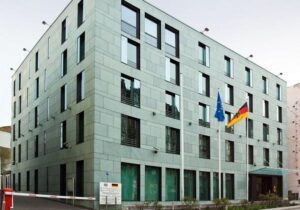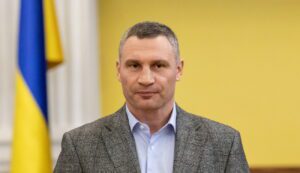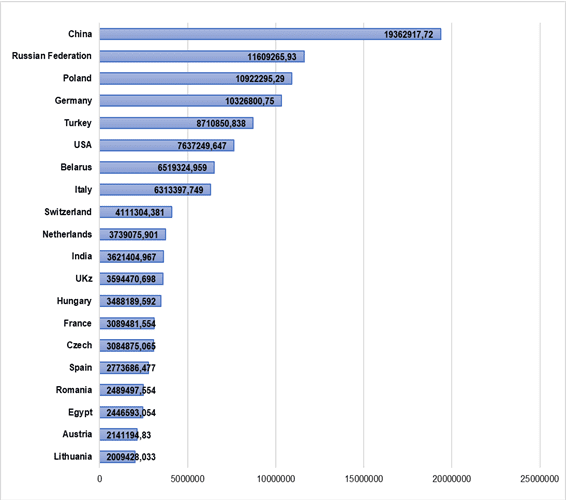
British Ferrexpo plc, which controls in Ukraine, in particular, Poltava and Yeristovo mining and processing plants, increased capital investments by 75.2% in 2021 compared to 2020, to $361 million from $206 million.
According to an annual report released by the company on Tuesday, in 2021, the capital investment per tonne of produced products was $160/tonne, while in 2020 this figure was $109/tonne.
At the same time, it is specified that last year, following the projects to increase the capacity of the processing plant (in 2020), the company began to modernize and increase the capacity of its granulator (pelletizer).
Of the $361 million, maintenance and capital expenditures for modernization totaled $113 million in 2021 (2020 – $103 million), including investments in all of Ferrexpo’s core business units. At the same time, investments were directed to the group’s concentrator and granulator, including an increase in capacity – the costs amounted to $111 million (in 2020 – $34.3 million). In addition, Poltava Mining has invested $34 million in a press filtration plant, which is scheduled for completion in 2022.
Additional capex areas are stripping for $69 million in 2021 (2020 – $14 million) and $6 million invested in infrastructure, development and exploration of the Belanovo field (Belanovo Mining), Haleschynske and Pivnichne fields (2020 – $6 million).
In addition, 2022 marks the 15th anniversary of the listing on the London Stock Exchange. During this time, the company has invested more than $3 billion in production, becoming the world’s third largest exporter of iron ore pellets, and is also starting to supply products with a higher iron content (67% Fe) to global markets.
The Group continues to invest and develop its assets, the report states.
After the completion of the initial upgrade of the pelletizing lines, it is planned to enter the next phase of growth, which will increase production of pellets by 3 million tonnes over the next three years. In October 2021, a decision was approved to focus on ore processing and high iron product operations while maximizing production and customer satisfaction.
At the same time, the company intends in the future to increase the total volume of ore production from 125 million tonnes in 2020 to about 265 million tonnes, spending $180 million on this. It is planned to invest $240 million to increase the capacity of crushing equipment and beneficiation to more than 45 million tonnes – contracts have already been signed with Metso and Weir Minerals.
In addition, to increase the capacity of one granulator line (out of four) by 3 million tonnes, investments will amount to $181 million.
It is planned to spend $28 million to solve logistics issues for transporting additional 3 million tonnes of pellets, which will require increasing the capacity of its port and purchasing additional wagons.
At the same time, the report states that investments to increase production by about 25% of existing capacities have been temporarily suspended by the group due to the war in Ukraine, but projects will be resumed after the situation in the country is clarified.

The Greek Embassy in Ukraine resumes its work in Kyiv, the Ministry of Foreign Affairs of Greece said.
“The Greek Embassy in Kyiv, whose leadership left the city for security reasons shortly after Russia invaded Ukraine, is reopening in the city with the necessary staff,” the Foreign Ministry said in a statement on its website Tuesday.
The Embassy, together with the Consulate General in Odesa, which operates as usual, will continue to provide assistance to Greek citizens, as well as expatriates in Ukraine.

The German Embassy will resume work in Kyiv, German Foreign Minister Annalena Berbock has said.
“Today we are also here, reopening our German embassy in Kyiv. At first it will be a limited activity. I am very glad that I am here with the Ambassador, Anka Feldhusen. She is accompanying me and she will continue to work in your free city” , Burbock said at a press conference with Ukrainian Foreign Minister Dmytro Kuleba in Kyiv on Tuesday.

Of the 3.5 million inhabitants of Kyiv, two-thirds have already returned to the capital, Mayor Vitali Klitschko said.
“Before the war, 3.5 million Kyivans were in our city… Almost two-thirds of Kyivans have already returned,” Klitschko said on the air of the National Telethon on Tuesday.
The mayor noted that there are still many restrictions in Kyiv due to the martial law: there is a curfew, there are still a large number of checkpoints, there is still a possibility of shelling the capital, and in the forest zone of the suburbs all territories have not yet been cleared of mines, there are many explosive objects, and therefore visiting green areas is prohibited. .
“That is, there are many restrictions. And if these restrictions do not scare you, then you can really return,” Klitschko said.
He stressed that he could not forbid the people of Kiev to return to the capital, but could only recommend.
“If you have the opportunity to be in more protected places, where there is no risk to your life and health, please stay. But if possible, we will not mind returning to our homes today,” the mayor said.

In the capital of Ukraine will return the fare in public transport, said the mayor of Kyiv Vitaliy Klitschko.
“We are already switching to paid travel in public transport,” Klitschko said on the air of the National Telethon on Tuesday.
At the same time, the mayor of the city did not specify when exactly the paid travel would resume, but noted that the price for it remains the same (UAH 8).
Klitschko explained the restoration of paid travel in public transport by the need to replenish the city budget.
“We understand that we now have a large amount of energy resources that we need, and electricity, and wages for our utilities, employees, and I can honestly say that the city will not pull, because the budget must be replenished,” the mayor said.
As reported, since February 24, due to the martial law associated with the military aggression of the Russian Federation, public transport in the capital has been free of charge.
Top 20 countries of Ukraine’s foreign trade partners in 2021 (thousand USD)
